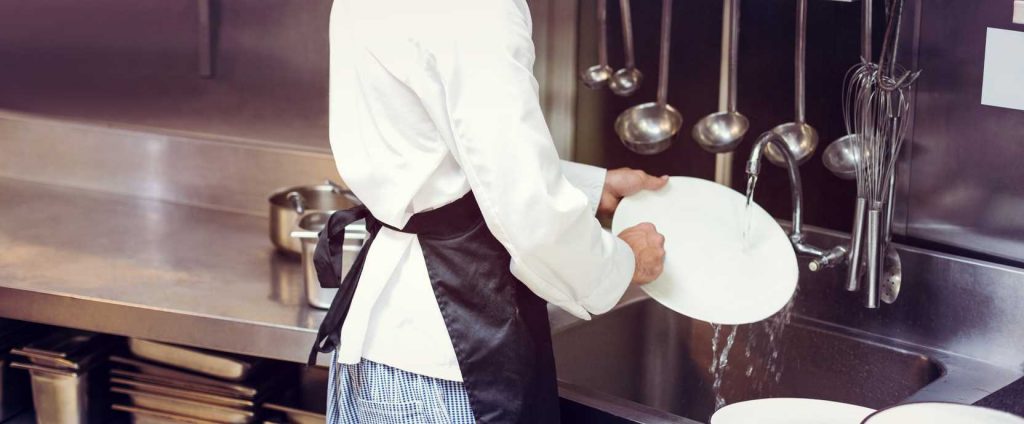Tips for Preventing a Clogged Commercial Kitchen Drain
Americans now spend more money dining out than they do at grocery stores. For this reason, the future looks bright for restaurants across the country. Anyone who has ever worked in a restaurant can attest to how fast the dinner rush can hit your establishment and keeping up with the demand can be difficult.
It's even more difficult when you run into every commercial kitchen owner's worst nightmare: a clogged commercial kitchen drain in the middle of a busy dinner rush. Nothing can make dinner service come to a screeching halt faster.
So how do you prevent your pipes from getting clogged as you're discarding food and washing dishes? Below you'll find our best tips for preventing clogs in your restaurant kitchen.
Make Sure Your Employees Scrape Those Plates
If you serve sauces or gravy at your restaurant, cleaning dishes afterward can be a nightmare. Especially if your customers hold onto their plates for a long time. Even so, scraping those dishes is a necessity if you want to avoid a clogged commercial kitchen drain. The grime that comes off of those plates can accumulate over time and back your pipes up.
You might have to incentivize scraping those dishes. You can't constantly watch your employees and some of them are going to break the rules when you're not around.
Put Food Scraps in the Trash
Food scraps can be a bigger problem than the grime you scrape off of dishes. They're larger, so they can easily get stuck in your pipes. Fortunately, you can eliminate this problem by taking one more step in the cleaning process.
Put food scraps in the trash before scraping the dishes. Even if the scraps seem small always have your employees do it.
Need another reason to set those scraps aside? The world wastes about $400 billion in food every single year. Try composting those scraps if chucking them in the trash makes you feel uncomfortable.
Place Fats, Oils, and Grease in a Container
Why do we cook with fats, oils, and grease? Besides the fact that they're tasty, sometimes we use them to provide structure. When working with some biscuit recipes, using cold butter is a must.
Unfortunately, the same structure we rely on to cook delicious dishes works against us when we're trying to unclog our pipes. When those oils and fats reach room temperature or get cold, they solidify.
Which is why you should never pour fats, oils, or greases down your drain. What’s the best way to deal with them?
First, let them cool down. After they've cooled sufficiently, transfer them to a container and toss that container in the garbage.
Use Something Absorbent to Wipe Fats, Oils, and Grease from Dishes
Sauces, meats, sauteed vegetables, and several other foods can leave an oily residue on dishes. It's not as harmless as many of us think. It has the potential to build up over time, ultimately clogging our pipes. Especially in restaurants in which thousands of dishes are used each day.
You can prevent this buildup by using something absorbent to wipe the fats, oils, and grease from dishes. Paper towels are a good option.
Run Hot Water Through Your Sink After Using It
You can't protect your pipes from every bit of oil or grease. You have to assume that you're washing some amount of grease down the drain each time you wash a dish. The solution here is to run hot water down your drains after each use. That hot water should cause the fats and oils you've rinsed down your drain to liquefy.
Pour a Cup of Vinegar Down Your Drain
Vinegar is an amazing, cost-effective cleaning product. It's also a common ingredient that's used in several dishes, so you probably already have a bottle or two in your restaurant's kitchen. Try pouring a cup of vinegar down your drain if you notice early stages of a clogged pipe.
All you have to do is measure out a cup of vinegar and pour it down your drain. Let it sit for a while and follow it up with some hot water. The acid in the vinegar will wash away a considerable amount of the grease that's starting to clog your drain. Just know that vinegar isn't a commercial solution. It won't prevent clogged drains forever.
Regularly Clean Your Grease Trap
If your commercial kitchen is required to have a grease trap, you're already on the road to preventing clogged pipes. But having a grease trap isn't the same thing as maintaining a grease trap. You need to actively maintain your grease trap. Having a poorly maintained grease trap won't prevent you from have a grease clogged drain.
Get a Commercial Sink Strainer
No matter what steps you take to try to prevent it, some food solids are still going to go down the drain. Instead of wasting time and money on restaurant drain clog repairs, The Drain Strainer prevents them from becoming blocked in the first place.
Our food solid separator allows the water from your sinks to filter through its strainer drawer while capturing all the solids that would normally clog your pipes. Other drain screens or straining systems go inside your sinks. While these prevent solids from going down the pipes, unfortunately, they also keep your commercial sinks from draining very effectively.
Employees eventually get frustrated and bypass those types of systems. This leads right back to the original problems that cost your business time and money to solve all over again.
The Drain Strainer lets your sinks drain faster and keeps food particles out of your pipes. Stop spending money unclogging your commercial kitchen drain and start preventing these problems with The Drain Strainer.

